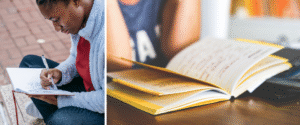Academic Wellness

This post discusses alcohol, drugs, and other information on substance use. If after reviewing the information and you believe you might have a problem with substance use, it is important that you seek professional assistance.
Academic wellness for first-year college students means more than just getting good grades—it’s about developing habits and strategies that help you learn effectively, manage your time, and stay motivated without burning out. Here’s what it should include:
Time Management & Organization
- Use a planner or digital calendar to track classes, deadlines, and exams.
- Break large assignments into smaller tasks with mini-deadlines.
- Set daily or weekly study goals to avoid last-minute cramming.
- Try time-blocking or the Pomodoro technique (25 min study / 5 min break).
Study Habits That Actually Work
- Manage your time
Use planners or apps to track deadlines and avoid last-minute stress. - Break up study sessions
Use techniques like 25 minutes of studying with 5 minutes of a break to avoid burnout. - Use campus resources
Tutoring centers, writing labs, and academic advisors are there to help. - Learn how you learn
Discover if you’re a visual, auditory, or hands-on learner and adjust your methods accordingly.
Knowing and Using Academic Resources
- Visit professor office hours – they’re there to help, and it builds relationships.
- Use tutoring centers, writing labs, or peer study groups.
- Take advantage of academic advising to stay on track with your program.
Class Engagement & Attendance
- Go to class – being present matters, even if lectures are recorded.
- Sit near the front or where you’re most attentive.
- Ask questions and participate – it improves understanding and retention.
- Review the syllabus often – it outlines expectations, key dates, and grading policies.
Goal Setting & Motivation
- Set realistic academic goals (e.g., “Get a B+ or higher in math” or “Read 10 pages/day”).
- Reflect weekly: What went well? What needs improvement?
- Celebrate small academic wins – finishing a paper, passing a quiz, or sticking to a study schedule.
Balance and Burnout Prevention
- Don’t study 24/7 – build in breaks, hobbies, and social time.
- Learn to say no to overcommitments (clubs, jobs, etc.) if they affect academics.
- Take mental health breaks – your brain needs rest to process and perform.
Growth Mindset & Self-Compassion
- Believe in progress over perfection – mistakes are part of learning.
- Don’t compare yourself to others; everyone adjusts to college differently.
- Be kind to yourself during tough academic weeks – seek help early.
Academic Integrity
- Learn what counts as plagiarism, cheating, or unauthorized collaboration.
- Use citation tools and ask for help if you’re unsure.
- Being honest in your work builds confidence and trust in your ability.
First-Year Academic Wellness Checklist
☑️ Reflect weekly on academic goals and progress
☑️ Attend all classes (or watch lectures if missed)
☑️ Review notes within 24 hours
☑️ Complete readings before class
☑️ Visit at least 1 office hour per week/month
☑️ Use at least one campus academic resource (e.g., tutoring)
☑️ Use a planner or calendar daily
☑️ Take breaks and maintain sleep
☑️ Be cautious with substance use – this can derail your academic career
Next Article in Module:
All content on the RTT Virtual Hub is for educational purposes only and is not a substitute for professional advice, diagnosis, or treatment.
If you or someone you know is in crisis, please call or text the 24/7 SAMHSA Helpline at 1-800-662-HELP (4357).
Comments are closed.



